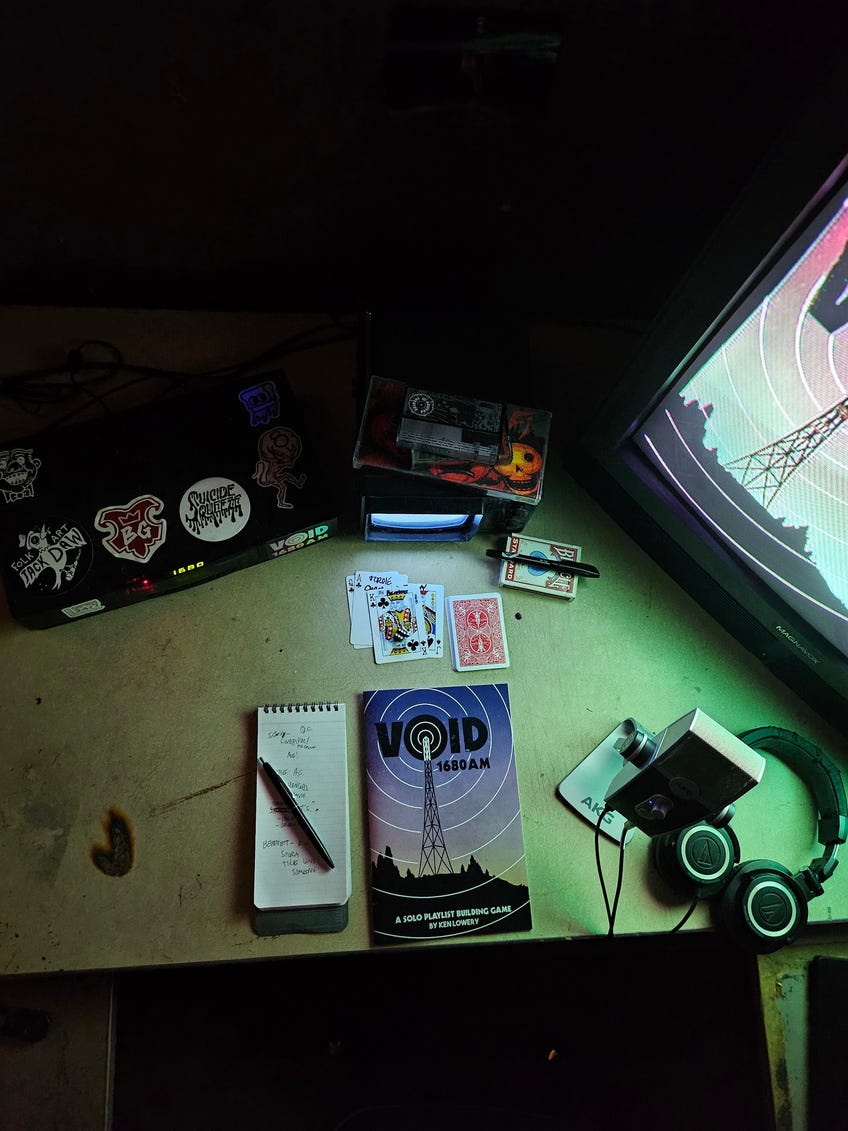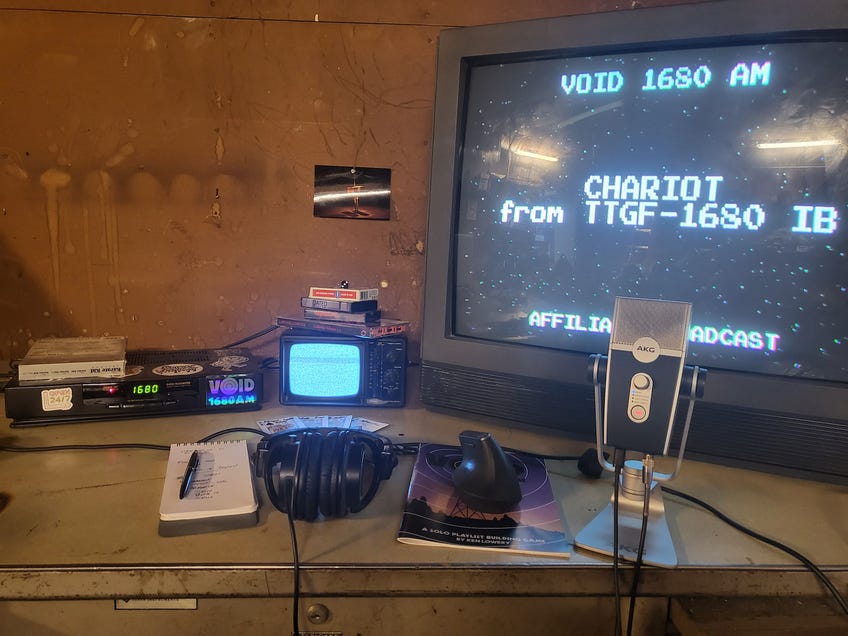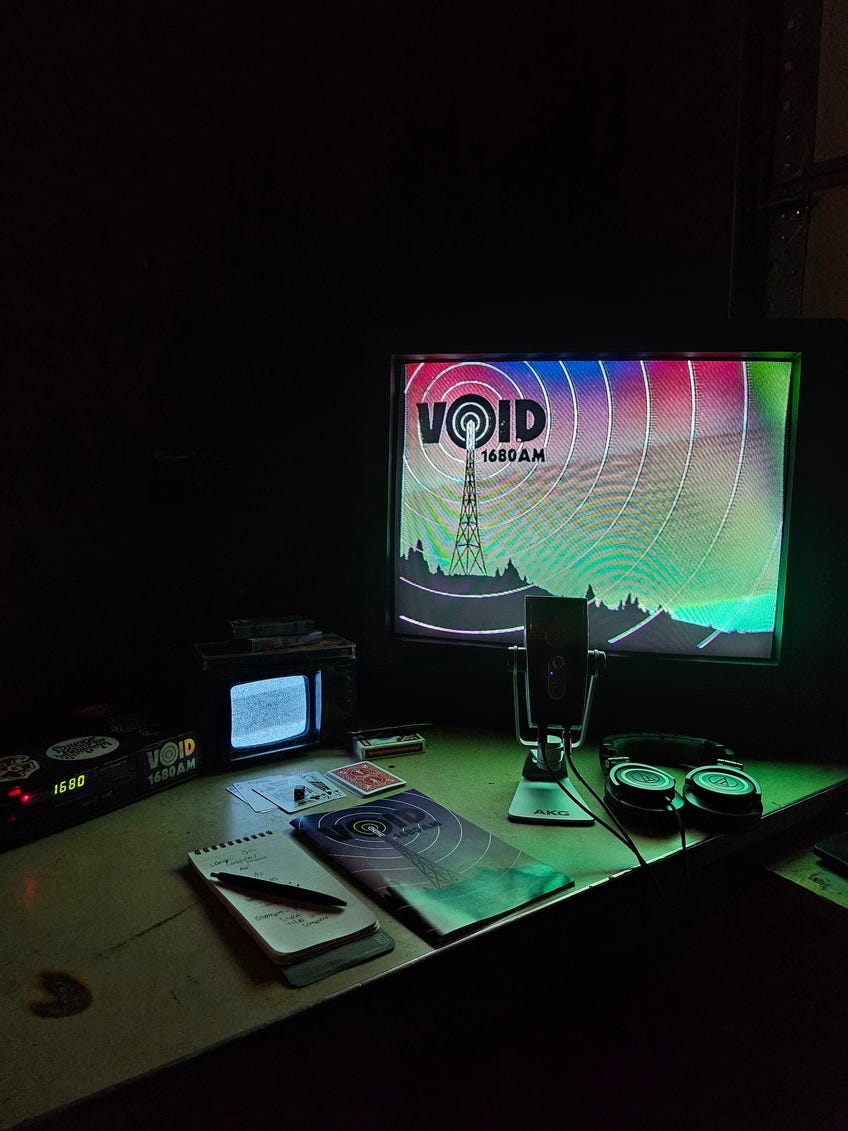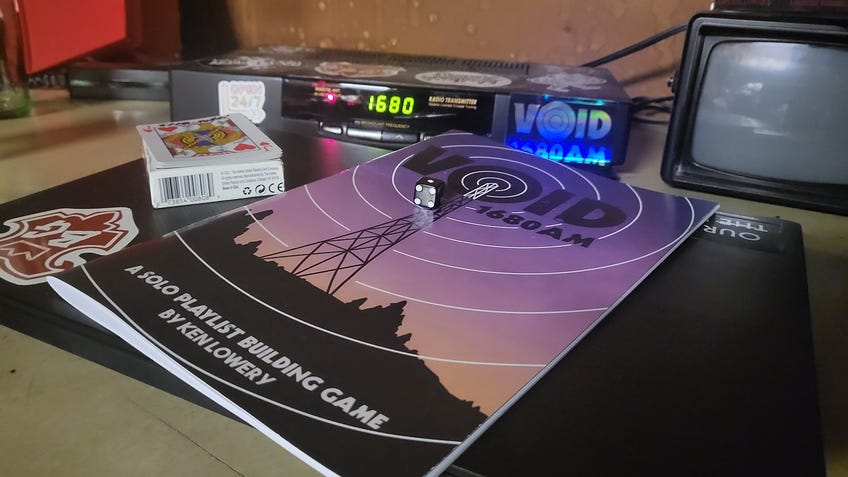VOID 1680 AM creator talks comic books and tabletop RPG similarities and exploring the lonely airwaves
You’re not alone out there, caller.
As a Texan working for a UK-based publication, I tend to play a lot of tabletop RPGs by myself. Solo experiences are fairly common in this hobby and have flourished since the pandemic created the perfect creative impetus for lonely, isolated gaming. My favourite of 2023 was Ken Lowery’s VOID 1680 AM, which puts you in the role of a late-night AM radio station operator, broadcasting a curated playlist of songs to a tiny host of ears, all of them tuned in for their own lonely reasons.
Some of them call in searching for connection, others are desperate to platform their weird beliefs and bottled emotions. Many simply love the odd comfort of isolation offered by the empty night air and prefer human contact like ships passing in the dark. Players will talk with them all, familiarising themselves with the cast of local outcasts and hermits in the breaks between song blocks.
Dicebreaker spoke with Lowery earlier this year after VOID 1680 won a Judges Spotlight honour from the 2023 ENnie awards. A former comic book writer and publisher, the Texas-based designer was equally honoured and surprised that so many people had connected with his odd expression of creativity. As we end the year and head into the holidays - a time when many might keenly feel the sting of disconnections, it’s well worth investigating the wonder one can find in the meeting of modulated sound waves and a midnight disc jockey.
Dicebreaker: How did you get into game design? It's very cool to hear that you did self-published comics for several years - is there a bridge from that into tabletop RPG publishing?
Ken Lowery: Yeah, not directly. VOID 1680 AM and Lighthouse at the End of the World are in standard American comic book size. And that's because that's what I know how to make because I've made tons of comics. I had a printer I liked, I knew what kind of schedule they worked on, and I knew how to budget for them. Of course, I spent eight years working with artists, meeting a lot of artists whose work I love but never had enough for. Then there was learning project management, basically. Those kinds of broader skills and connections helped me when I jumped into games and decided I'm going to do only what I want to do. I'm going to have fun. I'm going to chase every whim and explore every idea.
To that end, every cover artist I've had is a comic book artist, someone I knew and may have worked with before or was just friends with and admired. Jordan Witt, who did the cover for VOID 1680 AM, we made a self published comic together 10 years ago, and we've just known each other forever. It was really cool to work with Jordan again. I pretty much just taught myself layout on the fly, really dug into like all the Mörk Borg resources on how to use public domain. I brought a lot of stuff I learned over basically eight years of doing everything wrong making comics, just to try to do it a little bit better in games.
How was it to make that leap? Walk me through the emotional process as you made that transition.
So much of the game is about somewhat ironically sitting alone in a dark room trying to find community, which I think is something in the social media age we can relate to pretty well.
The first few things I made were just simple tables. They were basically if you've got a dark fantasy type of game - not naming any names - here's some tables to really weird them up some more. It was just fun to make tables, but it also allowed me to learn simple one-page layouts, create the Twitter account, learn how to talk about these things, hook up with people and get into those conversations. At that point, I was not really aware of RPGs and designers as a scene - I was strictly a player. What really broke through for me was an adventure for Mark Borg. They did a folklore jam in early 2021, and while I'm not a death metal guy myself I really liked the masterful control of tone and that game - every single page, every inch of it - tells you what that game should feel like. I really responded to that.
So, I jumped into their discord, and that community is so supportive and so friendly and helpful at answering all my dumb, first-time, little baby questions about how to do anything. I submitted that [adventure] and that was so gratifying. Getting genuine feedback and advice and enthusiasm was really, really encouraging. You know, I think I've made $100 off of that thing in two and a half years. But the response to it was so overwhelming that I was like, “oh, okay, I've got something here. Let's keep going.”

Are there a lot of similarities or differences between comics and tabletop RPGs, as a creator and publisher? For example, the Comics industry pioneered Kickstarter and crowdfunding as a way to get their work into people's hands, and tabletop picked up that torch in a big way.
So much of the creative process is so very similar. Just the small teams working together. For lack of a better phrase, the production pipeline is so similar. Comics tend to work on a much longer timeline, but in terms of how to table the conventions, how to network (that’s a word I find a little bit dirty, but you get the idea) and how to link up with the community. Essentially, a lot of us are very similar. How they find their audiences outside of traditional avenues because those are so narrow, so choked by a couple of very familiar brands that dominate everything. You have to find those alternate venues, and you have to find your audience.
AM radio sits in this weird space for me where it is very vintage, very rare, very much a hobbyist, niche type thing, but it's not a very old art form.
While I was making indie comics, I really had to tell myself superhero fans are not comic book fans; they are superhero fans, and there's nothing wrong with that. But there's nothing on earth that's going to make the guy who's buying Green Lantern comics for 30 years turn around and buy my weird little horror comic. It's a similar thing with RPGs - I'm not chasing the Dungeons & Dragons crowd. Again, fine, totally cool. It's not a value judgment. It's just really recognizing that's not where the audience is. Don't find comic book readers; find people who like your genre of stuff or niche in any medium, and get it into their hands.
It's so interesting to hear that you hire comics artists to do the art for your RPGs. Why don’t we see more cross-pollination between comics and RPG artists?
I don't see it show up in RPGs that often. Sally Cantirino, who did the cover art for Lighthouse at the End of the World, does comic books. Her partner is an RPG designer, and she's worked on Cobwebs for World Champ Game Company. So, she’s in both worlds already, but I feel like it's a really untapped vein. The conditions that RPGs work on are honestly much more favorable to working comic book artists. In terms of indie, the timelines are much more relaxed. The subject matter is fun and wild and weird and all over the place. Any kind of artist that is looking for something new they want to try, there's probably a game out there that does that and that needs art.
Let’s get into the genesis of VOID 1680 AM.
Before VOID 1680 AM was a game, it was a radio station. I have an AM radio transmitter and then the range extender in the garage on top of the garage. I got a bonus one year and was like, “Okay, I'm finally doing this.” It was one of those things I had bookmarked for years. The AM transmitter itself maybe covers the house. The range extender gets it up to about two miles and altogether cost approximately 600 to 650 bucks.
Generally, I just wanted to broadcast stuff on the air. Even if no one ever heard it, I just wanted to do it. I'm not a hobbyist in the sense that I'm super technically proficient, nothing like that. I've just always enjoyed the romance of radio, especially that kind of lonesome, but not sad, not downer vibe of being the person in the booth by yourself. Just figuring out what this thing is that you've got to express.
I couldn't tell you exactly when it started to become an idea for a game. In mid-2022 I'd done some early experimental broadcasts, and some friends tuned in to listen to the live stream on YouTube. But it was pretty much just me playing for me. At some point, I really got on this solo game train, which was not planned. That was completely by accident. I felt like there's something to the idea of the radio. What can I do with this? How can I make this a vehicle for expression?

The very early stage of the game was very spooky dread or similar to Wretched & Alone, using the Jenga Tower and everything. At some point, I really stopped and said, “Okay, I'm making this tone how I would play it. I need to step back and give people room to figure out how they would play with tone.” So, I went with creating this engine for building playlists for figuring out that self expression. And I did want people talking - I want them to either talk as themselves or adopt a persona.
've just always enjoyed the romance of radio, especially that kind of lonesome, but not sad, not downer vibe of being the person in the booth by yourself.
In terms of systems, reading Anamnesis by Sam Leigh really helped me figure out how to structure it out and introduce the idea of breaks between the song blocks. My ultimate goal once you are done is that you have a complete object. You have a broadcast - your beginning, your middle and your end. You have your songs, you have the stories that tie them together, you talk about your callers a little bit (or a lot). You have a full story. Ultimately, it's something I wanted for myself. And I just kind of put it out there with the hopes that other people would respond to it.
Is that how you've always approached RPGs: come out the other side with something to look at, a collection of experiences?
Yes, for sure. Building playlists has been kind of a tradition in my family since I was a little kid. I'm the youngest of three. My sister is 13 years older than me - she's 55. Since she was a teenager in the 80s, she would make for Mother's Day every year - at mom's request - a playlist for her full of the stuff she was listening to. For my mom, it was a way to stay current on music, tune into what her kids were into. My brother, the middle child, picked it up, and I picked it up after that. We still make her mixes now.
I've always made mixes for myself while writing comics. Lighthouses at the End of the World has a playlist linked in the text - that's always been a very important component to me. I am, in terms of talent, very much not a musician, but music is the thing I most aspire to. My usual refrain is, “I want this to feel like that song.” I feel like that collided with the idea of creating an object, this final thing that you have when you're done playing, to land on this radio program idea.

Just like AM radio, playlists or mixes on cassettes, CDs, memory sticks, etc. feels like a novelty. A dying art form. Is there some resonance there for you?
AM radio sits in this weird space for me where it is very vintage, very rare, very much a hobbyist, niche type thing, but it's not a very old art form. It's seven years older than TV. In terms of art forms, it's as young as jazz, it's as young as TV. But as we've gone digital, it's fallen out of use and, ironically, opened up again,for people who just want to jump on and do something. I really liked that idea. You see it in a lot of younger generations and the way they use social media - or pointedly don't use social media. I think they're falling back to those much more handmade kinds of experiences.
Did you always plan to ask people to send in their broadcasts so that you could play them on your AM radio transmitter?
Don't find comic book readers; find people who like your genre of stuff or niche in any medium, and get it into their hands.
It came along fairly early in the process because I wonder what's the thing that they have at the end of this. So much of the game is about somewhat ironically sitting alone in a dark room trying to find community, which I think is something in the social media age we can relate to pretty well. If the idea is that I want you to express yourself and understand that people might be hearing you, I wanted to validate that. I will hear you, and I will broadcast you. Whoever watches will also hear you. It allows people to leave a mark, however faint and ephemeral. This is a way to make it live on a little bit and build this ad hoc community.
Are you still accepting submissions if people want to send in their broadcasts? And how can people tune in?
I'm always accepting submissions. The best way to listen is through my neighborhood, the two miles around my house. Assuming you're not parked in my neighborhood, well, I'm broadcasting on YouTube. I do schedule ahead of time because about half the time YouTube will take them down after the broadcast due to copyright strikes. Embrace that - radio is very transient. That's just how it is. The moment is the thing.


